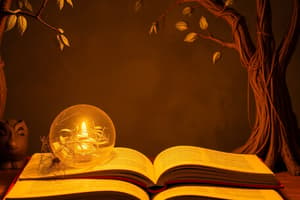Podcast
Questions and Answers
Pre-colonial literature in the Philippines includes works produced after Spanish colonization.
Pre-colonial literature in the Philippines includes works produced after Spanish colonization.
False (B)
Folktales are characterized as anonymous and timeless, belonging to a people and circulated orally.
Folktales are characterized as anonymous and timeless, belonging to a people and circulated orally.
True (A)
Fables commonly feature human characters engaged in everyday activities.
Fables commonly feature human characters engaged in everyday activities.
False (B)
Legends portray human heroes and are presented as historical fact.
Legends portray human heroes and are presented as historical fact.
Myths are traditional stories that often involve supernatural elements and logical reasoning.
Myths are traditional stories that often involve supernatural elements and logical reasoning.
Proverbs or aphorisms are meant to express community beliefs and instill values through lengthy narratives.
Proverbs or aphorisms are meant to express community beliefs and instill values through lengthy narratives.
Pasyon encompasses the life and suffering of Jesus Christ, while Senakulo is a performance of the Pasyon.
Pasyon encompasses the life and suffering of Jesus Christ, while Senakulo is a performance of the Pasyon.
Korido and Awit both narrate tales of chivalry and heroic adventures.
Korido and Awit both narrate tales of chivalry and heroic adventures.
Propaganda literature includes creative works aimed at supporting Spanish rule.
Propaganda literature includes creative works aimed at supporting Spanish rule.
The American Period in the Philippines is marked by a significant decline in education and culture.
The American Period in the Philippines is marked by a significant decline in education and culture.
Flashcards are hidden until you start studying
Study Notes
Pre-Colonial Literature
- Comprises all literary works produced before Spanish colonization, including chants, proverbs, songs, and folk narratives.
- Primarily transmitted orally from one generation to another.
- Reflects the people's livelihood, customs, and traditions through varied and distinct folk narratives.
Types of Folk Narratives
- Folktales: Anonymous, timeless tales circulated orally, emphasizing shared cultural experiences.
- Fables: Feature animal characters or inanimate objects that behave like humans, imparting moral lessons.
- Legends: Stories presented as history, portraying human heroes engaged in remarkable deeds, distinct from myths.
- Riddles: Comprise rhymed, measured lines (4 to 12 syllables) with imagery symbolizing unknown objects for guessing.
- Myths: Traditional stories set in a timeless past with supernatural elements, beyond logical explanations.
- Epic: Narrative poems celebrating the adventures and achievements of heroes.
Proverbs and Folk Songs
- Proverbs/Aphorisms: Short, rhyming expressions conveying community beliefs and moral values.
- Folk Songs: Lyrics that express collective hopes, lifestyles, and love stories of the people.
Religious Literature
- Focuses on the life, death, and passion of Jesus Christ.
- Pasyon: A narrative about the suffering and death of Jesus.
- Senakulo: A reenactment of the Pasyon.
- Komedya: Depicts European society exploring themes of love, fame, and journeys.
Secular Literature
- Revolves around tales of bravery and adventure.
- Awit: Chivalric tales where knights undertake heroic deeds to rescue princesses.
- Korido: Poetic tales adhering to a structured format.
- Prose Narratives: Instructional materials aimed at teaching Filipinos proper behavior, exemplified by "Pagsusulat ng Dalawang Binibini na si Urbana at Feliza" (1864).
Propaganda Literature
- Involves satirical works, editorials, and news articles aimed at critiquing Spanish colonial rule.
The American Period
- Marked significant advancements in education and culture in the Philippines.
- English was used alongside Filipino, reflecting the introduction of the Philippine Public Instruction System.
- Free public education was provided to Filipinos, leading to literature that mirrored American styles.
- Forms of literature included poetry, drama, and adaptions of novels.
The Japanese Period
- Resulted in a significant pause in Philippine literature.
- English was forbidden, and writing in Filipino was mandated, leading to a shift in literary focus.
- Many writers produced plays, poems, and short stories centered on provincial life themes.
Studying That Suits You
Use AI to generate personalized quizzes and flashcards to suit your learning preferences.



